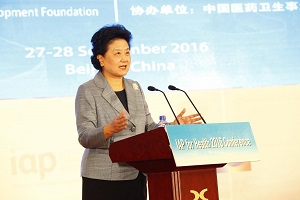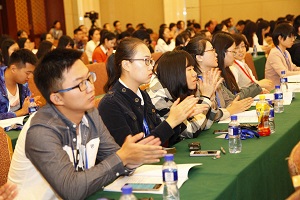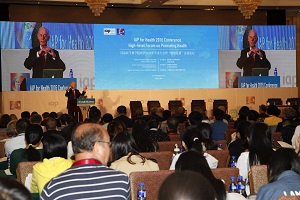[IN PROGRESS - Hyperlinks need to be replaced + photos to be added]
 On an increasingly crowded planet, fighting disease and providing for healthy lives to everyone is a global challenge that will test human ingenuity and generosity. But it is possible if we promote health diligently and take health threats seriously, said global leaders in healthcare and medicine at the InterAcademy Partnership for Health Conference 2016 in Beijing, China.
On an increasingly crowded planet, fighting disease and providing for healthy lives to everyone is a global challenge that will test human ingenuity and generosity. But it is possible if we promote health diligently and take health threats seriously, said global leaders in healthcare and medicine at the InterAcademy Partnership for Health Conference 2016 in Beijing, China.
 Human health is better now that it has ever been in human history, said Anthony Capon of the International Institute for Global Health at the United Nations University. But there are still global health problems such as neglected tropical diseases and non-communicable diseases – such as those typically faced by ageing populations. And global environmental challenges such as climate change will exacerbate these challenges.
Human health is better now that it has ever been in human history, said Anthony Capon of the International Institute for Global Health at the United Nations University. But there are still global health problems such as neglected tropical diseases and non-communicable diseases – such as those typically faced by ageing populations. And global environmental challenges such as climate change will exacerbate these challenges.
”But there is a good news story,” Capon noted. “Action taken on climate change will also benefit health. Renewable energy means less toxic pollution. Human health and environmental health complement one another.”
Hosted by the Chinese Academy of Engineering (CAE), the IAP for Health Conference 2016– on the theme of ‘Promoting Health’ – took place from 27-28 September at the Beijing Conference Centre. At the conference, global experts in medical research, medical practice, and healthcare systems discussed best practices, new concepts and the future of healthcare worldwide, including how the concept of ‘promoting health’ can contribute to the Sustainable Development Goals (SDGs). In addition, more than 300 representatives of China’s healthcare system, as well as students, attended.
.jpg) The event also provided a platform for the launch the latest IAP for Health Statement, “A call for action to improve the reproducibility of biomedical research on 27 September.
The event also provided a platform for the launch the latest IAP for Health Statement, “A call for action to improve the reproducibility of biomedical research on 27 September.
China’s Vice Premier Liu Yandong delivered the conference’s keynote speech on 28 September, calling for the establishment of a global health governance system and for greater aid for public health research in developing countries. China and the world have an obligation to make sure that those living in poverty won’t remain in poverty because of diseases such as HIV and malaria, she affirmed.
“All these diseases are challenges to the health of humankind and the world,” said Liu. “The strongest weapon we have to fight all major diseases is innovation in medical science.”
 Fifty years ago, the popular perception of infectious diseases among medical experts was that they would soon cease to be a threat. But that belief has proven very wrong, said US National Academy of Medicine Foreign Secretary Margaret Hamburg. Not only do mosquito-carried diseases plague much of the developing world, but outbreaks such as Ebola and Zika serve as a reminder of the power of infectious diseases to destroy lives and disrupt societies.
Fifty years ago, the popular perception of infectious diseases among medical experts was that they would soon cease to be a threat. But that belief has proven very wrong, said US National Academy of Medicine Foreign Secretary Margaret Hamburg. Not only do mosquito-carried diseases plague much of the developing world, but outbreaks such as Ebola and Zika serve as a reminder of the power of infectious diseases to destroy lives and disrupt societies.
Hamburg called infectious diseases a security threat that has been neglected, and argued that global leadership must invest more in researching and preparing for them, and to do so with urgency. “We can’t let any of these wake up calls just be a wake-up call,” she said. “We need action; we need a global health risk framework.”
Oyewale Tomori, president of the Nigerian Academy of Science, in his talk about infectious disease control and prevention, vigorously argued that individual countries have to invest in their own public health systems if they are going to control diseases like Ebola. International cooperation is good, but if a country can’t contain its own diseases, then they will spread out of control.
“The weakest link in the chain is in the country itself,” said Tomori. “Cutting corners will not lead to excellence.”
The fight against disease will also mean preserving our most effective existing defenses. Anthony So of the Global Health Signature Initiative of the Johns Hopkins Bloomberg School of Public Health discussed the importance of combating the growing problem of resistance developing to many of our antimicrobial drugs.
Frighteningly, a 2015 study found colistin, an antibiotic that serves as the last line of defence, became less effective in China where it was widely being used in farm animals. In response, China reduced the non-therapeutic use of the drug in livestock by 30%. So noted that China could go even further, taking advantage of a remarkable opportunity to simultaneously promote healthier lifestyles by reducing the population’s meat consumption.
”Many would argue that the drug should be removed entirely from farm animals,” said So. “Otherwise we might wind up with everybody’s nightmare: A superbug that is pan-resistant to antibiotics.”
Major health challenges don’t only come in the form of infectious diseases. Addiction, mental health, and non-communicable diseases such as diabetes and cancer are also growing concerns as people worldwide live longer lives. But the best way to control these diseases is to encourage healthy lifestyles.
Smoking is one major problem that the world must confront confirmed Kelvin Chuan Heng Khow of the Tobacco Free Initiative and World Health Organization, in his talk highlighting the importance of tobacco control. About 80-90% of smokers begin the extremely addictive habit before the age of 18, he pointed out, including some 25% before the age of 10.
“It’s the only legal consumer product that can kill two-thirds of its consumers when used according to manufacturer’s instructions,” said Khow. “Up to a billion deaths in the next century are possible if there’s no change.”
The topic of promoting health was also discussed from several other diverse angles. One session focused on the role of traditional medicine in the future of promoting health, while other speakers explored how to approach health issues amid urban expansion and how social marketing can guide people toward healthier behaviour. The final session investigated transforming the health sector and how to build capacity in developing and emerging and economies while reaching everyone – leaving no-one behind – including in developed economies.
The IAP for Health conference was organized in collaboration with the Chinese Academy of Medical Sciences and Peking Union Medical College, and sponsored by the China Health and Medical Development Foundation.